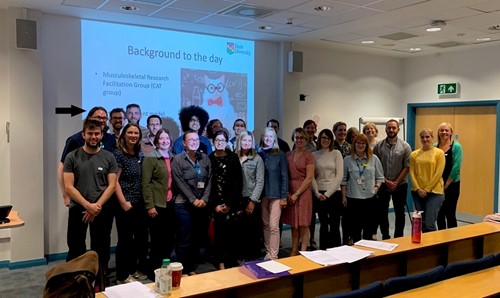I was invited onto this course at Keele University by a physiotherapist whose CAT (Critically Appraised Topic) group I’d joined earlier this year to help them find the evidence they need for their CATs. For those of you who haven’t heard of CATs, they are basically clinical questions arising from daily practice. My group meets roughly once a quarter to discuss their chosen specialist areas, progress being made and any possible gaps in the evidence.
I jumped at the chance to attend the course, even though it was at only two days’ notice, because I felt it was necessary - even essential - for me to understand the whole process and not just my evidence-gathering part of it. It also meant I could forge closer ties to an organisation outside the NHS.
I invited my furry cats to come with me for a trip out of the area, and one seemed very interested. The other refused, though, and since the first wouldn’t go without her I ended up going on my own.

Me hidden at the back of the CAT group
I was mainly interested in learning the whole process of CATs and how my part fits into the overall picture: when clinical questions arise from daily practice, evidence is needed to support and improve the practice. If no evidence is available, or maybe there’s just not enough evidence to support a conclusion, further research is needed to fill the gap.
The day itself consisted of several sections:
Morning
The first part of the morning was taken up by explaining the background and reason for doing CATs, and an overview of the process, and to choose areas of professional interest that we could discuss in smaller groups. Then we split into these groups to use the PICO (patient, intervention, comparison and outcome) method to create a workable search question in our chosen area.
Before lunch
We went into the IT suite for a training session on how to use databases to search for evidence. Each group needed to find at least one good article – preferably a systematic review.
After lunch
Once again in our smaller groups we used the CASP toolkit to critically appraise the article we’d found, and to see if it answered our research question or if there was a gap in the evidence. Normally this would take several articles, including more than one systematic review, as well as Randomised Controlled Trials (depending on what was available from the search).
At the end of the day
We reconvened as a large group and gave our conclusions as to whether we could answer our questions, or if there was a gap in the evidence.
Now, while I was an attendee, I also ended up helping out at various points in the day, mainly in the practical searching section. I also promoted library and information services as much as I could to the group. As a result of this, one person asked for my email address in case he needed help; another person was grateful for my helping him with his searching and said that learning how library services can assist people was the most important lesson of the day!
My own learning points were two-fold: firstly, of course, I learnt what I set out to learn – the overall CAT process and how my part in it is integral as well as essential. But I also learnt that (depending on the question being asked) they’re looking for specific types of study, namely RCTs and systematic reviews. This will help me focus my searches and make them quicker and more productive.
It was a fun day to attend, very educational as well as enjoyable. I’ve also been asked back to attend next year as well: this time as a facilitator! I jumped at the opportunity.
Follow this link for more information about Keele University Critically Appraised Topics
Steve Collman
East Cheshire NHS Trust / Mid Cheshire NHS Foundation Trust

